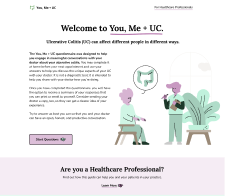Shared decision-making helps your patients and you
address their unique needs
Global surveys of patients with UC suggest that practices for facilitating
deeper conversations may include1,2:
Asking patients open-ended questions about how symptoms affect all parts of their lives
Aligning with patients on disease and treatment resources using terminology they are familiar with
Encouraging patients to share how they cope and adjust
Utilizing tools during appointments to facilitate open and honest communication, such as the Shared Decision-Making Guide
Resources
For you

Shared Decision-Making Guide
This guide is designed to assist you in taking conversations with your patients a step further to help them talk about certain aspects of UC that patients may not mention.
This guide is not a diagnostic tool.
For your patients

You, Me + UC
This digital questionnaire is designed for your patients to help them be better equipped to talk about their UC and how it affects many aspects of their lives.
This website is not a diagnostic tool.
UnCovered Insights
From a global survey of patients with UC
of patients
(n=1512)
Survey limitations: The data collected relied on accurate and honest recall and reporting by both patients and physicians. Patients were recruited based on physician-referred and self-reported diagnoses of UC, and their disease severity was established from their patient-reported medication history. Survey questions asked respondents to indicate their level of agreement from “strongly disagree” to “strongly agree.” Results reported here as “agree” contain responses from the “strongly agree” and “somewhat agree” categories. Patient participation was also limited to those with Internet access and those who had registered as members of online panels. Some physicians were also surveyed by phone, so there is potential for the interviewer to impact the results.1,2
Patient advocacy organizations
Help patients with UC find support by connecting them with patient advocacy organizations.
Crohn’s & Colitis Foundation
crohnscolitisfoundation.orgThe Great Bowel Movement
thegreatbowelmovement.orgColor of Crohn’s & Chronic Illness (COCCI)
cocci.orgSouth Asian IBD Alliance (SAIA)
southasianibd.orgGirls With Guts
girlswithguts.org
Poll
When talking to your patients about their UC,
which of these resources could you both benefit from?
These numbers reflect the cumulative results of HCPs who have completed this poll. The results are not a scientifically or a statistically representative sample.
IBD=inflammatory bowel disease; UC=ulcerative colitis.
References: 1. Dubinsky MC, Watanabe K, Molander P, et al; The Global UC Narrative Survey Panel. Ulcerative Colitis Narrative global survey findings: the impact of living with ulcerative colitis—patients’ and physicians’ view. Inflamm Bowel Dis. 2021;27(11):1747-1755. 2. Rubin DT, Hart A, Panaccione R, et al; The Global UC Narrative Survey Panel. Ulcerative Colitis Narrative global survey findings: communication gaps and agreements between patients and physicians. Inflamm Bowel Dis. 2021;27(7):1096-1106.